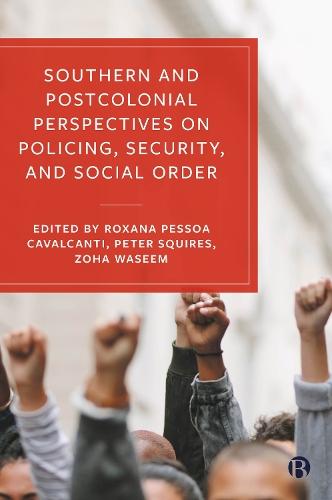Full Product Details
Author: John Lea (New: Visiting Professor, Goldsmith's College old: University of Leicester) ,
Lambros Fatsis (City St George’s, University of London) ,
Guilherme Benzaquen (Federal University of Pernambuco) ,
Danielle Watson (Queensland University of Technology)
Publisher: Bristol University Press
Imprint: Bristol University Press
ISBN: 9781529223668
ISBN 10: 1529223660
Pages: 378
Publication Date: 18 May 2023
Audience:
Professional and scholarly
,
General/trade
,
Professional & Vocational
,
General
Format: Hardback
Publisher's Status: Active
Availability: Manufactured on demand

We will order this item for you from a manufactured on demand supplier.
Reviews
"""Criminology is in dire need of Southern voices speaking for themselves and this book delivers. Authors from Africa and Latin America share critical reflections on topics such as violent policing and structural inequality within the criminal justice system, as well as resistance and activism."" Valeria Vegh Weis, Universität Konstanz and Universidad de Buenos Aires/Universidad Nacional de Quilmes ""This book emphasizes new perspectives from the Global South, always from rigorous and systematic points of view. This is a significant piece of criminological study, which will undoubtedly be able to reach different audiences interested in the issues debated."" Marcos Cesar Alvarez, University of Sao Paulo ""This book is jam packed with original Southern and Postcolonial Perspectives about the historical and contemporary legacies of colonialism and refreshing alternative visions for a more just social order. A total of 25 authors, thinkers, scholars and activists - from Central and Southern America, Southeast Asia, North and Southern Africa, the Middle East, the Caribbean and Oceania - have collaborated in its creation. The contributors expose the violence of policing, the patriarchy and racism of post-colonial states, the social exclusion and entrenched inequalities wrought by imperialism and nation building, sanitized as 'just war' or 'international peace keeping'. Case studies from favelas in Brazil, resistance fighters in Bougainville, feminist struggles for peace and security in Latin America, community policing in Trinidad, global protest movements such as - the Black Lives Matter Movement; punishment in the global periphery; privatisation of military power in Mozambique and Southern Africa, bear witness to the complex interlocking impacts of capitalism, patriarchy and colonisation on crime, violence, policing and criminal justice, in the past and the present. The edited volume makes a rich contribution to a growing area of global interest, expands the boundaries of southern and postcolonial criminology and calls for others to do likewise. I thoroughly commend the book to policy makers, critical thinkers, students and activists seeking to comprehend the far-reaching consequences of colonisation and its global boomerang effects."" Kerry Carrington, University of the Sunshine Coast"
"""Criminology is in dire need of Southern voices speaking for themselves and this book delivers. Authors from Africa and Latin America share critical reflections on topics such as violent policing and structural inequality within the criminal justice system, as well as resistance and activism."" Valeria Vegh Weis, Universit�t Konstanz and Universidad de Buenos Aires/Universidad Nacional de Quilmes ""This book emphasizes new perspectives from the Global South, always from rigorous and systematic points of view. This is a significant piece of criminological study, which will undoubtedly be able to reach different audiences interested in the issues debated."" Marcos Cesar Alvarez, University of Sao Paulo ""This book is jam packed with original Southern and Postcolonial Perspectives about the historical and contemporary legacies of colonialism and refreshing alternative visions for a more just social order. A total of 25 authors, thinkers, scholars and activists - from Central and Southern America, Southeast Asia, North and Southern Africa, the Middle East, the Caribbean and Oceania - have collaborated in its creation. The contributors expose the violence of policing, the patriarchy and racism of post-colonial states, the social exclusion and entrenched inequalities wrought by imperialism and nation building, sanitized as 'just war' or 'international peace keeping'. Case studies from favelas in Brazil, resistance fighters in Bougainville, feminist struggles for peace and security in Latin America, community policing in Trinidad, global protest movements such as - the Black Lives Matter Movement; punishment in the global periphery; privatisation of military power in Mozambique and Southern Africa, bear witness to the complex interlocking impacts of capitalism, patriarchy and colonisation on crime, violence, policing and criminal justice, in the past and the present. The edited volume makes a rich contribution to a growing area of global interest, expands the boundaries of southern and postcolonial criminology and calls for others to do likewise. I thoroughly commend the book to policy makers, critical thinkers, students and activists seeking to comprehend the far-reaching consequences of colonisation and its global boomerang effects."" Kerry Carrington, University of the Sunshine Coast"
Author Information
Roxana Pessoa Cavalcanti is a Principal Lecturer in Criminology at the University of Brighton. Peter Squires is Professor of Criminology and Public Policy at the University of Brighton. He was President of the British Society for Criminology 2015-2019. Zoha Waseem is an Assistant Professor in Criminology at the University of Warwick.




